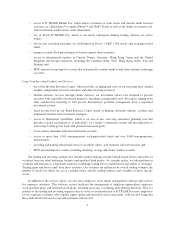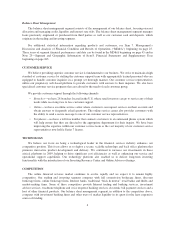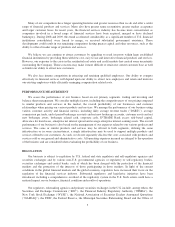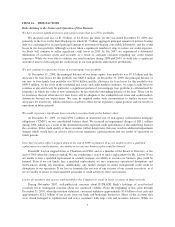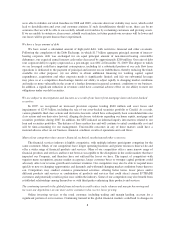eTrade 2009 Annual Report Download - page 16
Download and view the complete annual report
Please find page 16 of the 2009 eTrade annual report below. You can navigate through the pages in the report by either clicking on the pages listed below, or by using the keyword search tool below to find specific information within the annual report.“well capitalized” or “adequately capitalized” under applicable capital rules. A failure of E*TRADE Bank to be
“adequately capitalized” which is not cured within time periods specified in the indentures governing our debt
securities would constitute a default under our debt securities and likely result in the debt securities becoming
immediately due and payable at their full face value.
Similarly, failure to maintain the required net capital by our securities broker-dealers could result in
suspension or revocation of registration by the SEC and suspension or expulsion by FINRA, and could ultimately
lead to the firm’s liquidation. Net capital is the net worth of a broker or dealer (assets minus liabilities), less
deductions for certain types of assets. In the past, our broker-dealer subsidiaries have depended largely on capital
contributions by us in order to comply with net capital requirements. If such net capital rules are changed or
expanded, or if there is an unusually large charge against net capital, operations that require an intensive use of
capital could be limited. Such operations may include investing activities, marketing and the financing of
customer account balances. Also, our ability to withdraw capital from brokerage subsidiaries could be restricted,
which in turn could limit our ability to repay debt and redeem or purchase shares of our outstanding stock.
As a non-grandfathered savings and loan holding company, we are subject to regulations that could restrict our
ability to take advantage of certain business opportunities.
We are required to file periodic reports with the OTS and are subject to examination by the OTS. The OTS
also has certain types of enforcement powers over us, ETB Holdings, Inc. and certain of its subsidiaries, including
the ability to issue cease-and-desist orders, force divestiture of E*TRADE Bank and impose civil and monetary
penalties for violations of federal banking laws and regulations or for unsafe or unsound banking practices. In
addition, under the Gramm-Leach-Bliley Act, our activities are restricted to those that are financial in nature and
certain real estate-related activities. We may make merchant banking investments in companies whose activities are
not financial in nature if those investments are made for the purpose of appreciation and ultimate resale of the
investment and we do not manage or operate the company. Such merchant banking investments may be subject to
maximum holding periods and special recordkeeping and risk management requirements. In recent periods, the
Company moved its subsidiaries, E*TRADE Clearing LLC and E*TRADE Securities LLC, respectively, to become
operating subsidiaries of E*TRADE Bank, resulting in increased regulatory oversight and restrictions on the
activities of E*TRADE Clearing LLC and E*TRADE Securities LLC.
We believe all of our existing activities and investments are permissible under the Gramm-Leach-Bliley
Act, but the OTS has not yet fully interpreted these provisions. Even if our existing activities and investments are
permissible, we are unable to pursue future activities that are not financial in nature. We are also limited in our
ability to invest in other savings and loan holding companies.
In addition, E*TRADE Bank is subject to extensive regulation of its activities and investments,
capitalization, community reinvestment, risk management policies and procedures and relationships with
affiliated companies. Acquisitions of and mergers with other financial institutions, purchases of deposits and loan
portfolios, the establishment of new Bank subsidiaries and the commencement of new activities by Bank
subsidiaries require the prior approval of the OTS, and in some cases the FDIC, which may deny approval or
limit the scope of our planned activity. These regulations and conditions could place us at a competitive
disadvantage in an environment in which consolidation within the financial services industry is prevalent. Also,
these regulations and conditions could affect our ability to realize synergies from future acquisitions, could
negatively affect us following the acquisition and could also delay or prevent the development, introduction and
marketing of new products and services.
Risks Relating to Owning Our Stock
We are substantially restricted by the terms of our corporate debt.
The indentures governing our corporate debt contain various covenants and restrictions that limit our ability
and certain of our subsidiaries’ ability to, among other things:
• incur additional indebtedness;
13


